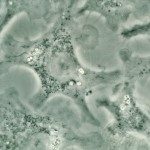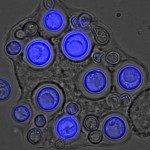Link to Pubmed [PMID] – 18951634
Mol. Immunol. 2009 Feb;46(4):601-12
In the present report, we revisited the B cell responsiveness of 7 wild-derived mouse strains to various toll-like receptor ligands (TLR-L). We found that 2 of them, namely PWK and STF presented profound defects in B cell proliferative responses to most of the TLR-L. Yet, their macrophage responses were largely unaffected, suggesting that regulation of TLR pathways are distinct in B cells and macrophages. We also showed that, anti-CD40 mAbs rescued the low proliferative responses to CpG in both PWK and STF B cells. In the other hand, CpG synergized with LPS to induce high levels of proliferation in STF B cells, which did not respond to LPS alone. Cytokine or immunoglobulin (Ig) productions, in vitro, were less impaired than the proliferative responses to LPS or CpG alone. In STF B cells, both ERK, P38 and JNK pathways were affected following in vitro TLR4 or TLR9 signaling. Moreover, while the basal levels of Ig secreting cells and of serum Igs were similar to that of control mice, antibody responses to both TI and TD antigens were severely affected, mainly in STF mice. Our findings therefore highlight the relevance of wild-derived mouse strains and TLR-L to study B cell physiology.





